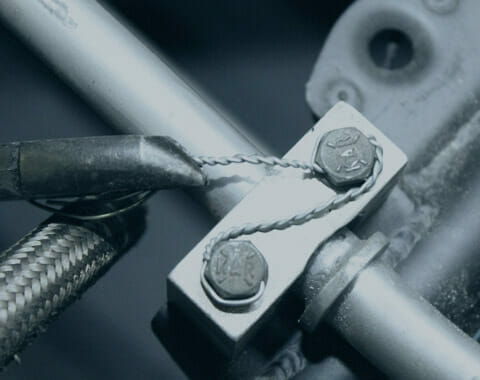On This Page
How Is Metal Wire Made?
Metal wire is a flexible, cylindrical rod used across industries for its versatility and reliability. Producing wire that is metal looks different depending on the final application, but it includes processes like casting, fogging, extruding, rolling, and drawing. Sometimes, wire that is metal will need to be heat treated, other times it will need to undergo a deformation process. The different steps taken to make this type of wire depends on the final product. For example, lock wire, also called safety wire, is made from different types of metals to act as a safety tool that ensures mechanical stability. For this reason, safety wire is produced to endure heavy levels of heat and vibration. Lock wire is often used in sports cars and aircraft engines to prevent the loosening of nuts and fasteners, so this high-stress environment demands serious strength and durability. This type of metal wire is made differently from wire used in the music industry to create piano strings, for example. It’s no secret that metal wire spans across industries. So how do you decide which type of wire you need for your facility?Properties of Metal Wire
 There are some key mechanical properties to keep in mind when looking for metal wire suppliers. Consider the yield strength of the wire. Yield strength is the point on a stress-strain curve that demonstrates the limit of elastic behavior and the beginning of plastic behavior. If you go below the yield point, the wire will deform elastically which means it will return to its original shape once the stress is removed. You’ll need to determine the yield strength of your wire application because this will tell you how much stress can be applied to the wire. Safety wire and music wire will have very different yield strength levels.
Another key property to consider is the elongation of the wire. This is the percent amount of deformation that occurs during a strength test. The elongation will tell you how well your metal wire will maintain its shape under stress. If your application requires your wire to stay in a specific shape or form for a long duration of time, you should determine the elongation percentage in advance before purchasing bulk metal wire.
There are some key mechanical properties to keep in mind when looking for metal wire suppliers. Consider the yield strength of the wire. Yield strength is the point on a stress-strain curve that demonstrates the limit of elastic behavior and the beginning of plastic behavior. If you go below the yield point, the wire will deform elastically which means it will return to its original shape once the stress is removed. You’ll need to determine the yield strength of your wire application because this will tell you how much stress can be applied to the wire. Safety wire and music wire will have very different yield strength levels.
Another key property to consider is the elongation of the wire. This is the percent amount of deformation that occurs during a strength test. The elongation will tell you how well your metal wire will maintain its shape under stress. If your application requires your wire to stay in a specific shape or form for a long duration of time, you should determine the elongation percentage in advance before purchasing bulk metal wire.

